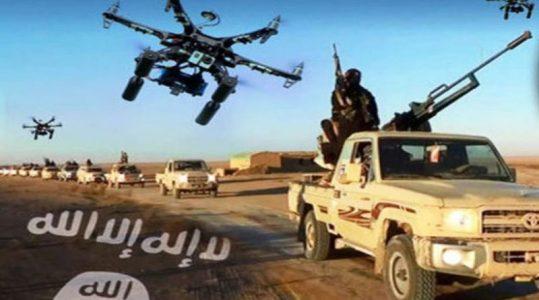
Islamic State terrorists are using drones to drop explosives on civilians and troops advancing on Mosul
The Islamic State of Iraq and the Levant (Isil) has evolved the use of drones to release explosive devices which they are dropping on civilians in districts of Mosul.
Isil has previously carried out surveillance with drones – usually commercially produced hobbyist quadrocopters but also larger homemade fixed wing craft.
Until recently though there was little evidence they had developed their use further but a series of recent strikes has now confirmed that they have developed the capability to drop 40 millimetre grenades.
In recently liberated districts of eastern Mosul, civilians flock to crowded street markets to stock up on food and fuel, making them vulnerable to the indiscriminate bombardment.
In one strike last week in eastern Mosul eight people were wounded in an attack on a market. The injured were treated in a field clinic set up in a partially destroyed mosque.
“I was shopping with my family when a small Isil plane dropped a grenade on us,” Hussein, 14, said as a medic injected painkillers into his arm as he waited to be treated for a broken bone protruding from his foot.
A wounded man who had been selling fruit and vegetables from a cart also reported seeing the drone drop explosives.
“This is the first time I’ve heard of Isil dropping weapons from a drone,” Iraqi special forces medic Colonel Khalil Jawad said.
Civilians account for nearly half of all casualties in the ongoing campaign to drive Isil from Mosul, which has advanced rapidly in recent weeks, driving the jihadis out of most districts in eastern Mosul.
Since October 17 last year over 135,500 civilians have fled the fighting but more than one million still remain inside Mosul.
Isil’s ability to drop targeted explosives from the air marks a new challenge for the army in what the UN has said is one of the largest urban battles since World War Two.
“It seems they are using these weaponised drones to harass Iraqi troops, perhaps even target Iraqi forward operating bases where officers might gather, and gain attention by spreading terror in a seemingly innovative way,” said Damien Spleeters, a field investigator for Conflict Armament Research, an organisation investigating weapons trafficking in conflict areas.
And Isil’s tactics have largely defeated the best efforts of the Iraqi Security Forces to limit civilian casualties, the UN’s humanitarian coordinator in Iraq Lise Grande said. “Civilians trapped inside Mosul are at extreme risk, probably nowhere is this more evident than in the casualty rate.”
Source: Telegraph





